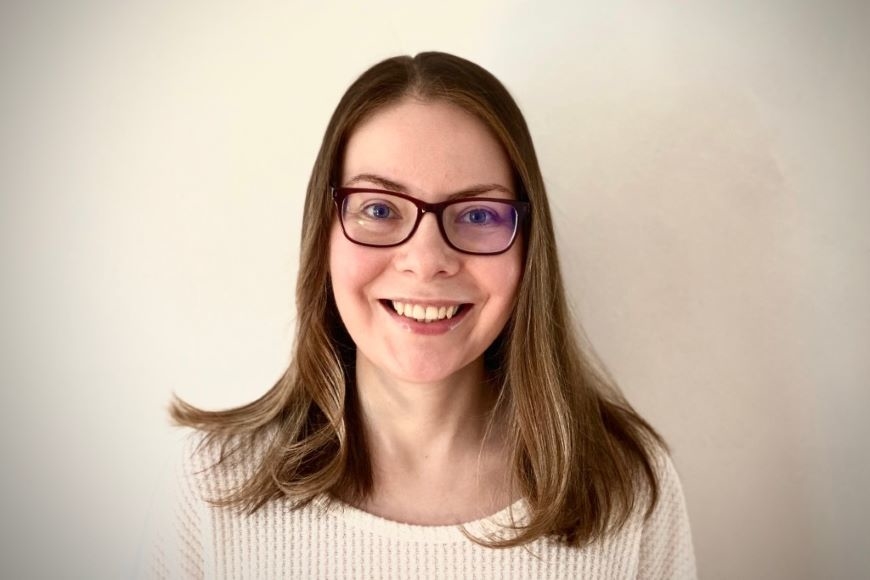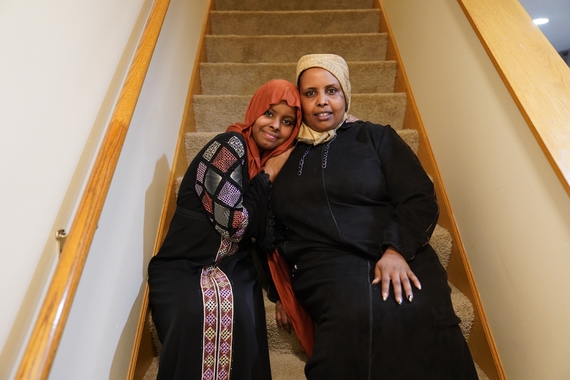Q&A with Irina Zaykovskaya
Our newest Russian lecturer Irina Zaykovskaya wants her students to “get that experience of learning something new, and challenging, and messy.” She discusses her research on emotional relationships with language, why introductory Russian is “where the magic happens,” and other areas of expertise she hopes to bring into the classroom.
What roles do you have at the University of Minnesota? What brought you here?
I am a new lecturer in Russian at the Department of German, Nordic, Slavic & Dutch. The most appealing fact about the department for me was the versatility of languages offered. The opportunity to work alongside both other Russian instructors and instructors of German, Finnish, and other languages is a huge bonus. It is always interesting to share teaching insights with those who teach languages other than the one I teach, and it helps one to stay up to date with developments in language-teaching research and practice beyond the narrow community of Russian instructors.
Another great thing about the U of M is that the work of language departments is supported by the Center for Advanced Research on Language Acquisition (CARLA) and CLA’s Language Center. I did my PhD at Michigan State where there is a similar center (Center for Language Teaching Advancement, or CeLTA), and I learned how big of a difference such a center makes for all language instructors at a given school.
What are your areas of specialty?
My go-to self-introduction in all professional settings is "Hi, I'm Irina, and I'm highly interdisciplinary." What this means is that I have multiple areas of specialty, I love them all, and I cannot imagine studying or doing research only within one of them. But for this interview, I would like to focus on being a language teacher, mostly Russian these days. (I began as a teacher of English but I haven't taught it in years.) Of course, I am interested in language teaching methods and I am always following what is happening in the field, but my special interest now is the emotional connection between a learner and the language they are learning.
I did a case study where I followed a learner of Russian for many years, through his study abroad experience and years after that. The findings obviously cannot be generalized to all learners of Russian or even to those with a similar demographic profile. However, the time spent with one individual allowed me to investigate his relationship with the language in depth, and the insights that such study brings are valuable. The most consistent and interesting theme of that research was... love. He literally talked about his relationship with Russian as a love affair, over and over again. Interestingly, he didn't even intend to study Russian at first, but the classes for his number one choice of language were full. And just like that, he fell in love with Russian. After years of study, including immersion and graduate school work, he had to change his career path for personal reasons, and yet the way he talked about Russian did not change: "maybe a little estranged, but something that we could both mutually come back together." That's the type of emotional connection that interests me.
A very different type of emotional relationship with the language could be widely observed among Russian-speaking Ukrainians after the war began in February: many of them could no longer bring themselves to speak their native language, because the trauma of what they went through was accompanied by the Russian speech, and that was enough of a trigger. The last time native language rejection occurred at such a scale was in the 1930s and ‘40s, among the Jews who managed to escape from the Nazi regime. Of course, in that I restrict my observations to publicly available data: as a Russian, I am not in a position to conduct research with Ukrainian participants at the moment; it would be a highly unethical endeavor. But this type of language-related trauma is no less important to study than love for a language one is learning. Humans do not just speak languages: they live them and experience them, and that's the process that fascinates me.
How did you become interested in what you study and teach?
Fortunate to have been born into a family with a particularly high number of post-graduate degrees per capita, I had little choice but to follow suit. However, I strayed away from my family quite far in terms of my area: my grandmother was a professor of geography for over 50 years, and on my desk there is always a piece of graphite from the first nuclear power plant in the world, Obninsk, which my grandfather, a thermal physicist, worked as a consultant for.
Growing up, I thought that what I loved most was literature, so that's what I wanted to study in college. Fortunately for me, the Russian education system is set up in a way that you cannot get a degree just in literature. Instead, you get a whole package called "Philology," which involves extensive study of not only literature but also linguistics and a lot of other things. During my first Intro to Linguistics class, I fell in love with it. I got my BA, then MA, then my first PhD in 2011 (technically, it is called "Candidate of Sciences" degree in Russia). Throughout my MA and PhD, I taught English and Russian as a Second Language at another university and worked there until I decided to move to the US and pursue another PhD.
It was a lucky coincidence: while traveling around the US as a tourist in summer 2013, I met someone who told me about second language acquisition as a research discipline. I hadn't heard about it before, and it didn't really exist in Russia, which is not surprising: it is a pretty young discipline within applied linguistics. I was intrigued. I googled it and stumbled upon the Second Language Studies at Michigan State. I was in Michigan, so I quickly emailed the program director asking if I could stop by and look around. I had no idea that I just cold-emailed Susan Gass, one of the founding parents of the discipline itself! I got an immediate response and an invitation, and Sue met with me, walked me around and introduced me to faculty and students. I now know how busy she must have been (she is busy even now, having retired!) but she was incredibly generous with her time. After returning home, I applied and I got in, just like that! Of course, the history repeated itself to a degree, and I immediately fell in love with sociolinguistics, so I ended up focusing my research on how language learners acquire variation in their second language. Sue co-chaired my dissertation committee together with a sociolinguistic professor Suzanne Wagner, my primary mentor and, frankly speaking, a role model in terms of her teaching and overall work ethic.
Before joining the U of M, I taught Russian at the Illinois Math and Science Academy, a boarding high school for kids from all over Illinois interested in STEM, and it was an incredible experience that I am very grateful for, not just as a teacher but as an immigrant who had never set foot in an American high school before. I think it helped me learn so much more about my chosen country that I could have never learned from books or movies.
What are you most excited about right now?
I am a person who gets excited easily, all the time, about everything. Starting a new job is incredibly exciting but I don't want to use all the clichés of being excited to meet colleagues and students, even though I genuinely am. But I think it is important for a teacher, especially a new one, to be honest and vulnerable, so I want to admit that I am also anxious and nervous: will students want to learn Russian now, when the country with which the language is associated for most people is committing war crimes against its neighbor? Will those willing to learn only see it as the language of the enemy that needs to be learned to understand the enemy better? Or will, perhaps, students share my view as a linguist that all languages are worth learning for their own sake, for their structure and their music? I would hope so, of course.
What courses are you currently teaching or looking forward to teaching soon? What's special about them?
This fall, I will be teaching RUSS 1101, which is Russian for beginners, and RUSS 3001, Intermediate Russian. I love the fact that I'll be able to teach different levels; it allows me to avoid the monotony of teaching the same course and helps maintain lesson planning and overall teaching skills.
There is something special about teaching beginners for me. I started my career teaching English and Russian in Russia (in 2006, sooo long ago!), but I didn't get to teach language to beginners back then. I was teaching at college, and English was pretty much mandatory in secondary schools in Russia, so none of the students were beginners. As for Russian, I worked mainly with study abroad students from the UK, so they always came already equipped with basic Russian skills. That's why I was terrified when I moved to the US to pursue my PhD and was assigned to teach a beginner's Russian class at Michigan State. How would I teach it? However, it was a blast. I quickly learned that the beginner's class is where the magic happens: students come in without knowing a single word of Russian, and by the end of the semester they make small talk with me before class! At no other level does a teacher observe such a huge leap in language skills as during that first semester.
I am also planning to develop some content courses that I would be able to offer to a wider audience of UMN students because they would be taught in English. I hope to be able to teach some of the following in the coming years:
- Building a Parallel State: The rise of NGOs and Volunteer Movements in Russia. While some non-governmental organizations (NGOs) in Russia date back to the early 1990s, the boom of NGOs and volunteer organizations occurred over the mid-2000s and 2010s. Search and rescue, palliative care, and even a national bone-marrow register function in the country largely because of NGO and volunteer efforts. (Read on to learn more about my connections to these efforts.) In recent years the regime has made a consistent effort to wipe clean the political field, with any organizational efforts—even without a clear political agenda—seen as a potential threat. That has resulted in government recruitment of some high-profile NGO leaders into local and state parliaments and passing “foreign agent” state legislation intended to label any non-compliant organization as anti-government.
- Language Policy in Russia and the Former Soviet Republics. This course would focus on the linguistic landscape of Russia and language policies in the National Republics as well as on the functioning of Russian in the countries with former Soviet ties (especially Belarus, Ukraine, Kazakhstan, and Latvia).
- Rising Like a Phoenix: Independent Media in Contemporary Russia. Tracking the development of independent Russian media from the explosive growth in 1990s to the extermination of independent TV in 2000s to the laws pushing media outside the country in 2010s to the complete shutdown of the remaining independent media after February 24, 2022 and rebirth from the ashes on YouTube and in Telegram (a popular social messaging app).
- From “Never Again” to “We Can Repeat That”: The Discourse Around World War II in Putin’s Russia. The appropriation of the WWII victory and grassroots efforts, such as “Immortal Regiment” parade, by Putin’s regime in order to unite the nation around its military history and change the perception of war from tragedy to a noble act of “our nation.”
What are some of the big takeaways students will get from your courses?
For this, I'd like to quote what Clair Kramsch, Emerita Professor of German and Affiliate Professor of Education at the University of California, Berkeley, wrote in the book The Multilingual Subject:
We are fooling ourselves if we believe that students learn only what they are taught. While teachers are busy teaching them to communicate accurately, fluently, and appropriately, students are inventing for themselves other ways of being in their bodies and their imaginations. Success in language learning is an artifact of schooling, of the need by institutions to demarcate those who know from those who don't, but the language-learning experience itself is neither successful nor unsuccessful. It can be lived more or less meaningfully and can be more or less transformative, no matter of what level of proficiency has been attained.
Clair Kramsch
That's what my goal is: to help students live through their language-learning experience more meaningfully and find those other ways of being in their bodies and their imaginations that will stay with them forever, even when they forget how to count to ten in Russian one day. The learner who participated in my longitudinal study eventually changed his career path and decided to not continue his study of Russian. And yet when we talked years after that, he was always coming back to that experience and to the impact of being exposed to a culture that, in his words, was "so much older than the entire history of this country." So I want my students to learn the language, yes, but also to get that experience of learning something new, and challenging, and messy (because authentic texts and speech will always be bigger and more complex than anything that is put into the best textbook). To have an access window to a new culture and to know something that is shared by not such a large community, and thus find good friends for life.
I also hope that my courses would help students disconnect (to a degree!) the Russian language, spoken (natively and non-natively) in many countries, from Russia, a multiethnic and multilingual country.
Are you involved with any community-engaged projects/courses? Who are you partnering with and what are you learning and doing?
I am not yet involved with such projects because I just moved to the Twin Cities area. However, I am already in contact with Stewart James-Lejarcegui from the University of St. Thomas who organizes open events at The Museum of Russian Art and I hope to be able to contribute to that work in the future.
I also participate in two volunteer projects in Russia.
- I am about to celebrate two years as a flight coordinator for the drone division of a volunteer search and rescue organization LizaAlert which was founded in 2010. To give you an idea of the scale of the organization, just in 2021 there were 42,727 search requests, 31,603 people were found alive, and 3,131 bodies were found/recovered. It happens that my division is more likely to find bodies because living people lost in the wilderness are more often found by the volunteers searching on foot, yelling and using lights and sounds. We celebrate (in a quiet way) if we find a body; it sounds weird, but it is not so when you realize how profoundly important it is for a family to be able to bury their loved one rather than have them missing for years. My job is preparing flight plans and negotiating air space restrictions to ensure the safety of operations, and it plays a very small but necessary part.
- Just a few days after Russia invaded Ukraine, one of the most prominent independent media in Russia, the radio station Echo of Moscow, was shut down by the Russian authorities, lost its building (and most of the employees who had to find other jobs) and moved to YouTube. I decided to pick up a small piece of the work and assembled a team that transcribes and publishes online a series of programs on historical crimes and court cases that have not very subtle parallels with current events (with the open blessing of the program authors). This helps the program reach a much wider audience than people comfortable using YouTube.



